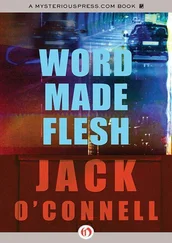Both of her eyes had been shot out.
The boy let himself fall down on top of her. He pulled her head next to his own, smearing his cheeks with the drying blood. He rolled into a sitting position, lifted Felice into his lap, held the weight of her head in his hands. Her skirt rode up on her thighs and he could see the patterns of contusion where the stockings had been ripped away. His chest began to tremble uncontrollably. He brought his mouth to hers, felt the coldness, brought a hand around and touched the lips, wiping the lipstick where it had smeared.
And then he convulsed, his head snapping backwards in a seizure-like series of twitches, his vision blurring, dissolving, until all he could see were flashes of grey and white, monstrous shadows that seemed to be approaching.
He woke to find himself in his own bed.
Papa was sitting on the edge, wiping the boy’s forehead with a washcloth.
“I am not angry,” Papa was saying.
Jakob tried to sit up. Gustav Weltsch, on the other side of the bed, pushed him gently back to reclining.
“You had us very worried, my son,” Papa said.
“I knew he’d be at the movie house,” Felix blurted from across the room.
“Thank goodness the projectionist called us,” Gustav said. “This flu is serious business.”
“You can’t go running to the films when you are sick like this, Jakob,” Papa says. “You should know better. Passing out in the cinema. Where is your sense, my boy?”
Papa made a head motion for Gustav and Felix to leave. He waited until the bedroom door closed and then pulled the covers up to Jakob’s chin. He brought his head close to the boy’s ear and whispered, “You rest now, Jakob. You get some more sleep.”
Papa folded the washcloth precisely and placed it on the nightstand. Then he stood and turned out the light. Jakob stared up at the man’s bulk, just his father’s outline, nothing more that that, barely visible in the darkness.
“Felix has packed all your things for you, like a good cousin,” Hermann Kinsky said walking to the door. “You get to sleep now. You need your strength, Jakob. We have a long journey ahead. But you can sleep on the freighter. The sea air will do those lungs a world of good. And when we arrive in America, you will be as fit as the rest of the family.
The chapel is in darkness as Jakob steps through the door. His father’s head is in silhouette, outlined only by the dim shine of the street lamp outside the stained-glass window. Hermann is seated in his chair but swiveled away from the altar/desk. It’s possible he’s fallen asleep, though the son can’t hear the heavy, guttural snore that normally signifies Papa at rest. If it were someone besides Hermann, he might believe the man was praying, speaking hopefully to a God who continues to hide his face.
Jakob stands in the doorway for a while, staring at the back of the father’s head. And though the boy is tempted to give way to what’s now an instinct and begin finding alternative ways to view the room, seeking interesting camera angles, methods of using the faint light to the best advantage, he refrains. He simply stands and breathes and stares at the rear of the head until the silence is broken by Hermann’s voice, sounding unusually low and tentative.
“You have your mother’s sense of timing, Jakob. She always knew when I needed to speak with her.”
Hermann turns his chair around. He’s holding a framed photograph in both hands. He continues to stare at the photo as he talks to the boy.
“Where is your cousin?”
Jakob gives the hint of a shrug and says without any sarcasm, “Oh, Papa, am I my cousin’s keeper?”
Hermann brings his face forward a bit, tried to get a better look at Jakob, as if he senses for the first time that his son might possibly be more than a tubercular repository of trivial dreams. Then he shakes his head slightly and looks back down at the photo.
“When your mother and I were first married, she would often wait up for me. Like this. Very late into the night. I’d return home to our flat on Budec Road. Six stories up, I’d climb those filthy stairs and wondered if she’d be spying through the crack in the door as I came around the corner. I’d give her my work sack. Maybe a few eggs. Half a loaf of plum bread. Once a bottle of Becherovka and a freshly slaughtered goose. Your mother loved me very much, Jakob.”
The son just nods.
The father gestures to the opposite seat. Jakob sits down, unfastens the top button of his shirt and loosens his tie.
“Schick kept you working late.”
“He’s a very dedicated man,” Jakob says.
“You need that in life,” Hermann answers, modulating his own voice to an identical volume. “You need to care deeply about what you do and why you do it. You can’t rely on luck.”
“I don’t believe in luck,” Jakob says.
“Neither do I,” Hermann says. “But what do you believe in, Jakob? Besides the movies.”
Jakob ignores the question and says, “Can I see it?” motioning toward the photograph.
Hermann stares across the table and just when Jakob thinks his father is about to say no, Papa slides the picture across the altar. Jakob picks it up and looks at his mother’s face, still a girl, not much older than Jakob is now, dressed in what must have passed as a wedding gown in those desperate times. Holding a bouquet of some sort to her chest. And staring out, slightly unfocused but somehow contented, pleased, happy with whatever thoughts had lodged in her mind at that moment twenty years before.
“She was a beautiful woman,” the son says.
Hermann shakes his head.
“Beauty is nothing. She was my religion. As close as I will ever come to having one. To worshipping something. To believing in a better moment. I have wondered, if she had lived, if she could have perhaps taught me to see things as she did. Maybe just a bit. If we’d had more time.”
“I’m sorry,” is all Jakob can think to say.
“Your father is a brutal man,” Hermann says. “I want to say that I had to become this way, but perhaps I was born this way.”
“It’s a brutal world, Papa.”
“Is that what the movies tell you?”
“Among other things.”
They sit in silence, stare at those parts of each other’s face that aren’t buried in shadow, until Hermann whispers, “Do you know what it’s like to live without any kind of faith, Jakob?”
“I don’t think I do, Papa. But faith isn’t a static thing. It’s a process. It’s a methodology. A way to get someplace else. And it comes and goes.”
“Sometimes, son, it never comes.”
“I think you have to want it. Very badly. You have to look in the right places.”
“You’ve seen so much in eighteen years, Jakob?”
“I’ve seen a lot of things.”
“From the comfort of a velour seat, squinting at a white screen.”
“No, Papa. From next to your elbow. With my eyes wide open.”
Another bout of silence that Hermann again breaks up by asking, “Where is Felix, Jakob?”
This time, Jakob answers, “I think maybe he’s visiting Johnny Yew.”
The boy doesn’t know what to expect, but after a second, Papa pushes his bulk back in the chair so that his face is lost in darkness. And then Jakob hears what might be a small laugh. A kind of suppressed chuckle. The father gets out of the chair and walks to the window.
“You know you’ve been a great disappointment to me?”
“I’m sorry about that too, Papa,” Jakob says. “But life is full of disappointments. That’s one of the things I’ve seen.”
He hears the old man walk back toward him, come to a stop behind his chair.
“And what,” Hermann asks, a little breathlessly, “is your greatest disappointment, my son? Did they close your favorite theatre one night? Did your favorite movie leave town?”
Читать дальше











